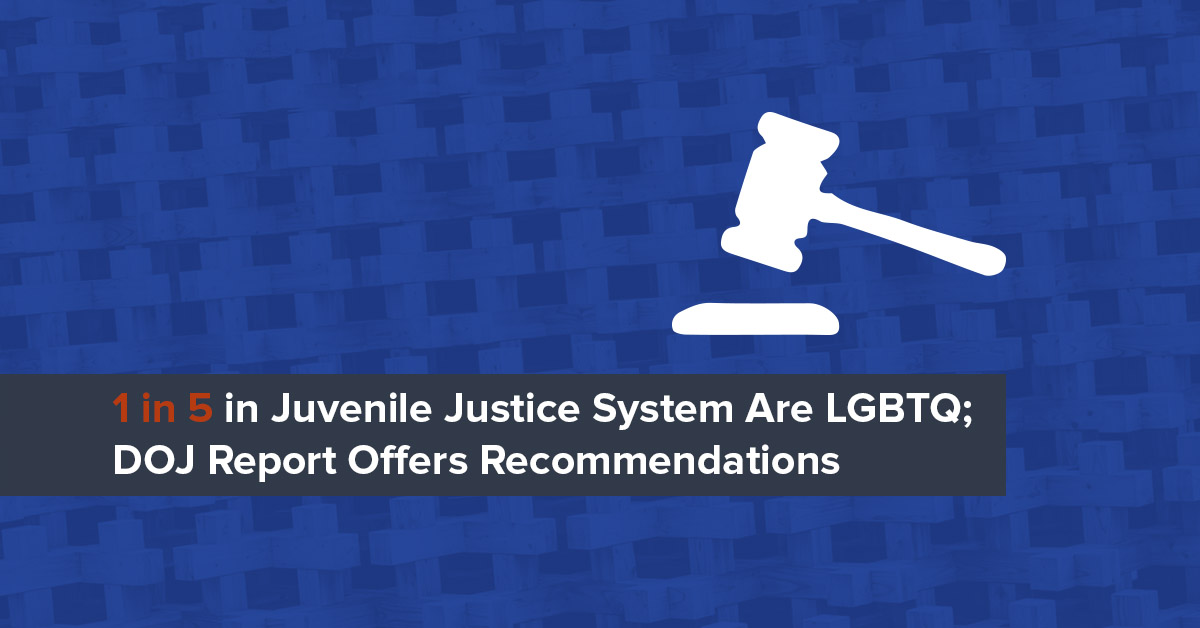1 in 5 in Juvenile Justice System Are LGBTQ; DOJ Report Offers Recommendations

As Pride Month came to a close and in the shadow of the Orlando tragedy, the Office of Juvenile Justice and Delinquency Prevention (OJJDP), part of the U.S. Department of Justice, released a report about LGBTQ youth within the juvenile justice system. The report, “Creating and Sustaining Fair and Beneficial Environments for LGBTQ Youth,” summarizes listening sessions that occurred over two days in late 2014 between the OJJDP and over fifty-five participants including researchers, practitioners, and youth experts from across the nation. OJJDP is currently preparing to update regulations for federal juvenile justice grants, and NCTE joins other youth advocates in urging the agency to incorporate key recommendations from this report, such as LGBT nondiscrimination requirements, into OJJDP’s grant rules.
OJJDP Administrator Robert L. Listenbee welcomed the participants by acknowledging he would be listening closely to what the experts had to say about challenges faced by lesbian, gay, bisexual, transgender, and questioning (LGBTQ) youth. In his opening remarks, Mr. Listenbee said, “the time has come for OJJDP to take a closer look at issues affecting LGBTQ youth, particularly in those instances where sexual orientation, gender identity, ethnicity, and race intersect.” Researchers estimate that 20% of all LGBTQ youth in juvenile detention centers are LGBTQ, including 40% of those in girls’ facilities.
While listening session participants acknowledged progress has been made to address some of the challenges faced by LGBTQ youth, they also noted that much more work is needed to ensure the safety and healthy development of all. The experts made presentations on a broad range of topics including: state and local policies, criminalization of LGBTQ youth, strategies to address homelessness, survival sex, tribal resolutions and codes, sexual assault, youth of color and law enforcement, and judicial leadership. As a result, seventy-six recommendations were generated under four categories, including:
- Increase the use of alternatives to detention for all vulnerable young people, including LGBTQ youth;
- Require nondiscrimination clauses in the areas of sexual orientation, gender identity, and gender expression to qualify for federal funding;
- Transgender people should be able to choose where they want to be placed while in custody [i.e., based on their gender identity vs. gender assigned at birth].
- Police officers, the courts, and correctional staff must receive specialized training and technical assistance to put LGBTQ youth on the path to health and well-being;
- Identify existing local, state, and federal data systems to add questions to regarding sexual orientation and gender identity, including on intake forms.
An unidentified participant during the two day listening session voiced perhaps the most critical component to ensure the success of the recommendations – “You can do trainings … and … and write policy all day long, but until people feel the need to follow these policies … I’m not sure anything will change.”
As the listening session ended, Administrator Listenbee acknowledged that it is going to take a long time to address all of the issues raised in a comprehensive way, but he emphasized OJJDP’s commitment to act on the report’s recommendations by informing the development of new policies and practices within the Office.
NCTE’s resource “Standing with LGBT Prisoners: An Advocate’s Guide to Ending Abuse and Combating Imprisonment” provides advocates with key information and approaches to advocate for policy changes in both the juvenile and adult criminal justice systems. For more on LGBTQ youth and juvenile justice, see the Annie E. Casey Foundation’s guide to “LGBT Youth in the Juvenile Justice System” and visit the Equity Project.

